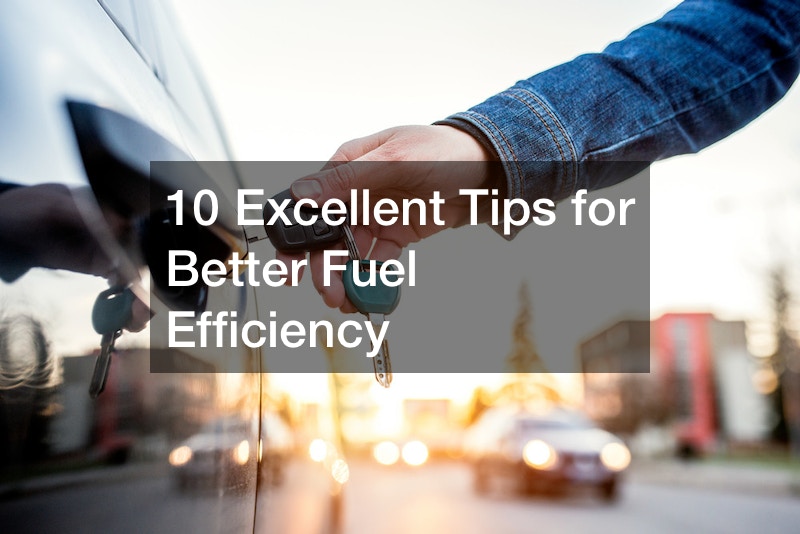
If you’re tired of seeing your hard-earned money disappear every time you hit the gas station, you’re not alone. It’s high time we all learned how to squeeze more miles out of each gallon. In the upcoming sections, we’ll explore 10 practical tips to achieve better fuel efficiency. Whether it’s about making minor adjustments to your driving habits or rethinking your vehicle maintenance routine, we’ve got you covered. Together, let’s make your journey on the road not just enjoyable but also cost-efficient!
1. Lower Your Speed
\

One often-overlooked event that can drastically improve your vehicle’s fuel efficiency is simply reducing your speed. It’s a common misconception that driving faster will get you to your destination quicker and thus save on fuel. However, the reality is that excessive speed can actually lead to higher fuel consumption.
Maintaining a moderate speed can help achieve a better fuel economy. Every vehicle has an optimal fuel-efficient speed, which is typically around 50-60 mph for most cars. Not only will this decrease your fuel consumption, but it also contributes to safer driving conditions, which is always a win-win situation.
Speed control isn’t only about sticking to a constant moderate speed. It’s also about avoiding sudden acceleration or braking, as these actions can significantly increase fuel consumption. Make it a habit to drive smoothly and steadily. You’ll be surprised at the difference it makes in your fuel efficiency.
2. Keep a Consistent Pace
Imagine you’re on your way to a wedding. You’re all dressed up, ready to enjoy the festivities, and the last thing you want is to arrive stressed, flustered, and late. You wouldn’t want to weave in and out of traffic, change lanes, or fluctuate your speed. Instead, you’d opt for a calm, consistent pace, which, incidentally, also leads to better fuel efficiency.
Maintaining a steady pace is more than just about comfort and safety — it’s also about optimizing your vehicle’s performance. When you’re constantly speeding up, only to slow down again, your vehicle uses more fuel. It’s like running a marathon by constantly changing your speed; your energy (or, in this case, your fuel) drains faster. But if you keep a steady pace, you’ll find that your vehicle becomes more fuel-efficient.
The next time you’re on the road, remember the scenario above. Keep a consistent pace, stay in the lane with the smoothest flow, and resist the urge to speed up unnecessarily. It’s about creating a rhythm with your driving, one that’s not only safer and less stressful but also promotes fuel efficiency. In the long run, your wallet — and our planet — will thank you.
3. Look for Tips on Car Forums
Car forums are a goldmine of information. These websites, rich in user-generated content, are often brimming with valuable advice and practical tips from seasoned drivers and car enthusiasts determined to achieve fuel efficiency. Don’t shy away from leveraging these platforms; after all, shared knowledge is what makes us grow.
You’d be amazed at the practical, real-world advice you can find on these forums. People who’ve been through the same struggles with fuel consumption are usually more than willing to share their discoveries and successes. There’s no one-size-fits-all solution in the quest for better fuel economy, and what works for one make or model might not work for yours.
Don’t forget to participate. Engage with others, ask questions, and offer your own experiences or insights if you can. The beauty of these forums lies in their reciprocal nature; the more we share, the more we learn. Drive on over to a car forum website, become part of the community, and start your journey towards fuel efficiency.
4. Limit AC Use

Air conditioning, while a godsend in scorching weather, can be a real gas drinker. It’s a well-known fact among drivers that the more you use your AC, the more fuel your car consumes. If you’re aiming for better fuel economy, one of your first steps should be to limit your AC use.
Of course, we can’t advocate for entirely ditching your AC, especially in hot climates. That’d be inhumane! But there are smarter ways to use your AC. For instance, if you’re driving at low speeds, try opening your windows instead. At higher speeds, however, closed windows are more fuel-efficient due to reduced wind resistance.
Also, think about using your car’s ventilation system during cooler parts of the day and save the AC for the sweltering midday heat. Every bit of fuel saved contributes to fuel efficiency. By thoughtfully managing your AC use, you’ll be making a huge stride towards a more fuel-efficient driving experience.
5. Utilize Car Pooling
Carpooling is another effective strategy to achieve fuel efficiency. The concept is straightforward: sharing rides with others who are headed in the same direction. This not only promotes efficiency but also fosters a sense of community. Think about your daily commute or your children’s ride to summer camp. How many of those trips could you consolidate by carpooling with neighbors, coworkers, or other parents? By sharing the journey, we can significantly decrease the number of cars on the road, reducing both fuel consumption and carbon emissions.
However, starting a carpool isn’t just about the environment or better fuel economy; it’s also about community. It’s an opportunity to connect with those around you, building bonds that extend beyond the confines of your vehicle. Shared journeys can lead to shared experiences, strengthening community ties and fostering a sense of collective responsibility.
Next time you’re heading out, why not check if someone else is going your way? Carpooling doesn’t have to be grand. It can be as simple as offering a neighbor a lift to the grocery store. Every journey shared is a step towards fuel efficiency and a greener planet.
6. Use the Correct Oil
When planning a cross country move, it’s important to note that the type of oil you use in your car can make a significant difference in fuel efficiency. Just like how we perform better when we eat the right foods, our vehicles run more efficiently when we use the right oil. High-quality engine oils can reduce friction, resulting in smoother engine operation and better fuel consumption.
It’s worth noting, however, that not all oils are created equal. There are different types of oils suited to different types of engines and climates. It’s crucial to use the oil recommended by your vehicle’s manufacturer. This is often specified in your car’s manual. If you’re in doubt, don’t hesitate to consult with a trusted mechanic or car expert.
Investing in the correct oil isn’t just about achieving fuel efficiency on a single trip, but it’s about prolonging the life of your vehicle. Especially when undertaking long journeys like a cross country move, the right oil can prevent engine wear, ensuring your vehicle remains reliable for many more adventures ahead.
7. Keep Your Window Up to Reduce Drag

Driving with your windows down, especially at high speeds, can increase aerodynamic drag. This is like trying to push a wall of air out of your way. It’s not unlike vaping, where the more you puff, the more energy you use. The same applies to your car; the more air it needs to push out of the way (due to your windows being down), the more fuel it consumes.
A simple solution that’ll lead to better fuel efficiency is keeping your windows up, especially when you’re driving on highways or at high speeds. According to studies, the drag caused by having your windows down can result in a 10% decrease in fuel efficiency. That’s a significant amount when you consider long-distance drives!
However, this doesn’t mean you have to suffer in a stuffy, hot car. Your AC can help maintain a comfortable temperature but remember to use it smartly to avoid unnecessary fuel consumption. In short, keep your windows up, use the AC wisely, and you’re on your way to a more fuel-efficient ride.
8. Don’t Idle Your Car
It’s a common myth that restarting your car uses more fuel than leaving it idling, especially when you’re waiting for someone or obeying a parking sign. In reality, idling for more than just a minute can consume more fuel than turning off and restarting the engine. Next time you’re waiting for a friend or stuck in a long queue, remember to turn off the engine. It’s one easy way to achieve better fuel efficiency.
Contrary to popular belief, idling isn’t great for your engine, either. It can lead to the build-up of fuel residues in the engine because it doesn’t run at its peak operating temperature. Over time, this can degrade the engine’s performance and increase maintenance costs. It’s not just about fuel – cutting down on idle time is also good for your car’s health.
But remember, safety first. Don’t turn off your engine at a red light or in heavy stop-and-go traffic. It’s more about those times when you’re parked and waiting. All these small actions, when combined, can lead to significant fuel savings. Let’s be mindful of our idling habits, not just for our wallets but for the health of our cars, too.
9. Remove Heavy Objects From Your Car
When it comes to fuel efficiency, every pound matters. You might not realize it, but the extra weight in your car’s storage, including unnecessary heavy objects, can significantly reduce your vehicle’s fuel efficiency. It’s simple physics — the heavier the load, the harder your engine has to work and the more fuel it consumes. A lighter car, on the other hand, requires less energy to move, leading to better fuel performance.
There’s a common tendency to treat our cars like mobile warehouses, hauling around items that we don’t immediately need. That golf bag from last weekend, the heavy toolkit ‘just in case,’ or the box of books you keep forgetting to donate – all these contribute to the unnecessary weight. Routinely clean out your car and remove items that don’t need to be there. This practice is not only good for fuel efficiency but also helps to keep your vehicle tidy and organized.
Consider the weight factor while packing for long trips. While it’s tempting to prepare for every possible scenario, try to resist the urge to over-pack. Carry only the essentials, and remember that lighter is better when it comes to fuel economy.
10. Find the Most Efficient Routes

Understanding and planning your driving routes can make a significant impact on fuel efficiency. It’s not uncommon to find ourselves driving around aimlessly in search of a restaurant or a particular store. This not only wastes time but also unnecessarily burns fuel. If you’re heading somewhere unfamiliar, take a moment to glance at the route on your phone or GPS device. Look for the most direct path, and also consider traffic conditions – constant stopping and starting in heavy traffic can consume more fuel.
Another strategy is to consolidate your errands into one trip. Rather than making multiple trips to the store, the post office, and that local restaurant you’ve been meaning to try, why not plan your route so you can hit all these places in one go? It’s more efficient to make one longer trip than several short ones, especially if you’re starting each one from a cold engine. This method not only saves time but also contributes to fuel economy.
Consider alternative routes that might be quieter or more scenic, even if they are slightly longer. High-speed driving on the highway consumes more fuel than driving at a slower pace. So, a more relaxed drive on a less congested road can often be more fuel-efficient, not to mention more enjoyable. Adopting these strategies can help significantly in achieving better fuel performance and a more satisfying driving experience.
To achieve fuel efficiency, we save money and contribute to sustainable and environmentally conscious driving. Simple adjustments in driving habits, like lowering speed, maintaining a consistent pace, and carpooling, have a positive impact on wallets and the planet. Small changes, such as keeping windows up to reduce drag, avoiding unnecessary idling, managing vehicle weight, and planning efficient routes, lead to a more fuel-efficient and enjoyable journey. Embrace these practices for cost-effective and eco-friendly road trips.



